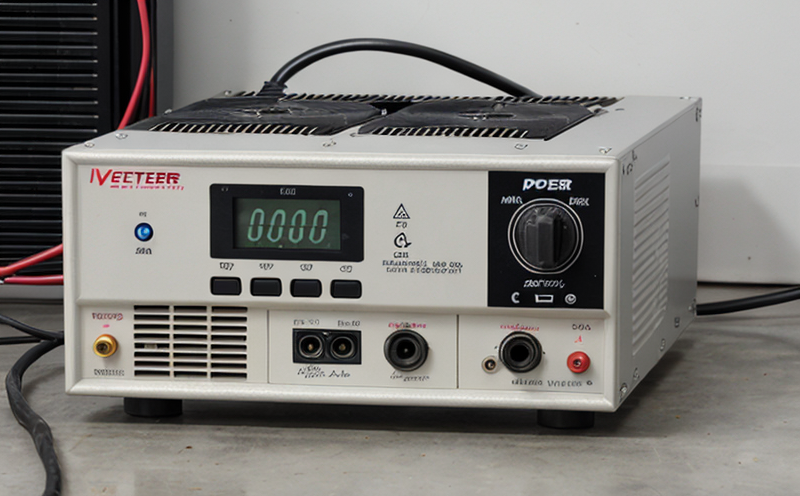IEC 62109-2 Safety Testing of Inverters for PV Applications
The International Electrotechnical Commission (IEC) standard IEC 62109-2 is a crucial document that outlines the safety requirements and test procedures specifically designed for inverters used in photovoltaic (PV) systems. This standard ensures that inverters meet stringent safety criteria, which are essential to protect both personnel and equipment from potential hazards.
Inverters play a pivotal role in converting direct current (DC) produced by solar panels into alternating current (AC), which can be used by the grid or household appliances. Given the critical nature of this conversion process, ensuring that inverters operate safely under all expected conditions is paramount. IEC 62109-2 provides comprehensive guidelines for testing these devices to meet global safety standards.
The standard covers a wide range of tests and requirements aimed at verifying the electrical performance, mechanical integrity, and operational robustness of PV inverters. This includes assessing the device’s ability to withstand overvoltage conditions, thermal stress, electromagnetic compatibility (EMC), and other environmental factors that could compromise safety or functionality.
Compliance with IEC 62109-2 is mandatory for manufacturers aiming to sell their products in international markets where these standards are enforced. For quality managers, compliance officers, R&D engineers, and procurement teams involved in PV technology development, understanding the nuances of this standard can significantly enhance product safety and marketability.
The testing procedures outlined in IEC 62109-2 are designed to be rigorous yet practical, ensuring that inverters not only meet the basic functional requirements but also demonstrate robustness against potential hazards. This includes detailed instructions on how to simulate real-world conditions during testing, such as temperature cycling and exposure to high-voltage transients.
By adhering strictly to these standards, manufacturers can ensure their products are safe for use in diverse environments, including residential, commercial, and industrial settings. The comprehensive nature of IEC 62109-2 also fosters a culture of continuous improvement within the industry, promoting innovation while maintaining high safety standards.
The standard’s emphasis on safety is particularly important given the increasing reliance on solar energy as part of global efforts to reduce carbon emissions and transition towards renewable sources. Ensuring that inverters meet these stringent requirements is essential for the widespread adoption of photovoltaic systems, which are a key component in achieving sustainable energy goals.
In summary, IEC 62109-2 Safety Testing of Inverters for PV Applications provides a framework for ensuring the safe and reliable operation of inverters used in solar power generation. This standard is vital for manufacturers seeking to comply with international regulations and for professionals involved in the design, testing, and certification of PV systems.
Applied Standards
| Standard | Description |
|---|---|
| IEC 61215-3:2017 | Photovoltaic modules -- Part 3: Test conditions, performance and qualification testing. |
| IEC 62109-2:2018 | Safety of photovoltaic inverters -- Part 2: Safety requirements for installation in PV systems. |
| EN 50603:2014 | Cosmetic appearance and dimensional accuracy of photovoltaic (PV) modules. |
These standards are integral to the comprehensive testing process for PV inverters, ensuring that all components meet stringent safety and performance criteria. Compliance with these international standards not only guarantees product quality but also facilitates smoother market entry in various regions around the world.
Benefits
- Mandates adherence to global safety regulations.
- Ensures consistent product quality across different environments.
- Fosters innovation by setting high performance benchmarks.
- Aids in market entry and compliance with international standards.
- Enhances customer trust through proven safety measures.
- Reduces the risk of product recalls and associated costs.
- Promotes sustainable energy solutions by ensuring reliable PV system operation.
By implementing these rigorous testing procedures, manufacturers can ensure their inverters are not only safe but also reliable and efficient. This not only enhances marketability but also contributes to the broader goal of promoting renewable energy use worldwide.
Customer Impact and Satisfaction
The implementation of IEC 62109-2 Safety Testing has a direct impact on customer satisfaction by ensuring that inverters are safe, reliable, and perform optimally under various conditions. This standard addresses the primary concerns of both manufacturers and end-users regarding product safety and performance.
Manufacturers who adhere to this standard benefit from increased market credibility and trust among their customers. By demonstrating compliance with international standards, they can confidently promote their products as high-quality, safe solutions for PV systems. This not only enhances brand reputation but also opens up new markets and opportunities for growth.
End-users of these inverters can rest assured that the devices they purchase meet stringent safety requirements, reducing concerns about potential hazards or malfunctions. This translates to increased customer satisfaction and loyalty, as users are more likely to recommend products that have been rigorously tested and certified.
The reliability and performance of inverters are critical factors in the success of PV systems. By ensuring compliance with IEC 62109-2 Safety Testing, manufacturers contribute to the overall efficiency and longevity of these systems. This, in turn, benefits end-users by providing a stable energy source that is both safe and reliable.
In summary, adherence to this standard not only enhances product safety but also fosters trust and satisfaction among customers, ultimately driving market success for all stakeholders involved in PV technology.





